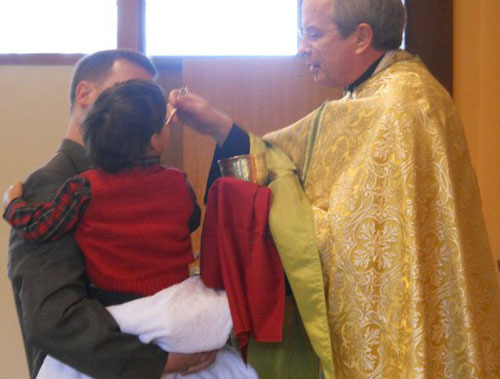The Mysteries and Eastern Christianity
After I had posted a few photos taken during the Baptism, Chrismation, and first Communion of my youngest son (age three), a  reader asked:
reader asked:
I always wondered about the tradition in Eastern Christianity (both Orthodox and Catholic) of administering all three sacraments of initiation at once. Will your son then be able to receive Holy Communion whenever he attends Mass from now on, or will he have to wait until the "age of reason" (approximately age 7-8) before he can receive it again? Also, would it be correct to assume that in the Eastern tradition, there is no separate sacrament of Confirmation at a later age, since Chrismation was already conferred at baptism? It would be interesting to know how and why the Eastern and Western traditions diverged regarding the conferring of the sacraments of initiation.
Once a child receives the three mysteries—"mysteries" being the more common name for the sacraments in the East—he can receive Holy Communion from that time forward. The age of reason has nothing to do with the reception of Holy Communion in the East. Chrismation is the sacrament of confirmation: "The symbolism of anointing with oil also signifies the Holy Spirit, to the point of becoming a synonym for the Holy Spirit. In Christian initiation, anointing is the sacramental sign of Confirmation, called "chrismation" in the Churches of the East" (CCC, par. 695).
Why do the East and West differ as to when the sacraments of confirmation and Holy Eucharist are given to children? In the early Church, it was common practice for babies to be baptized, chrismated, and then receive Communion (however, it should be kept in mind that the sacrament of christmation/confirmation has a long and complicated history). Two different customs developed: in the West, bishops generally became the ministers of confirmation, while in the East, priests were generally the ministers of the the sacrament, using the chrism oil blessed by the bishop. There was also the issue of the "age of reason" as it related to the sacrament of confession; in the West, this eventually led to children not receiving first Communion until they had gone to confession, which meant they had to be of a certain age (usually seven) before reception of Eucharist.
While the East has maintained the older practice of chrismating immediately following baptism, confirmation in the West was/is administered at different ages, with the sacraments of initiation given in the same order: baptism, confirmation, and Holy Communion, with the latter two delayed to a later age. About a hundred year ago, Piux X desired for children to receive Communion at an age earlier than was typical at the time (early teens). So Communion was moved to an earlier age ("age of reason"), while confirmation was not moved. The usual practice has been to administer the sacrament of confirmation during the teen years, but there is increased interest in administering it at a much younger age, in part because it makes more sense theologically for confirmation to follow baptism and precede first Communion.
Carl E. Olson's Blog
- Carl E. Olson's profile
- 20 followers



